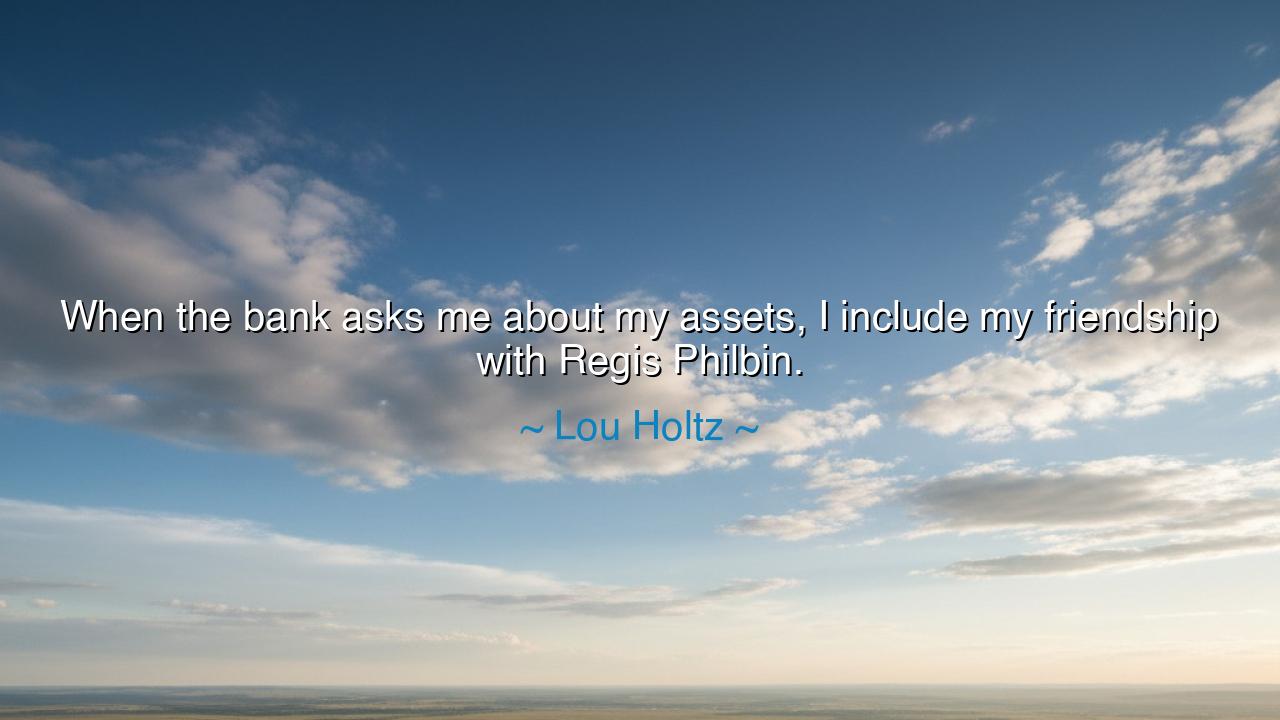
When the bank asks me about my assets, I include my friendship






In the words of Lou Holtz, the legendary coach and man of enduring spirit, there lies a truth that shines brighter than gold: “When the bank asks me about my assets, I include my friendship with Regis Philbin.” At first, this saying may draw a smile — for it has the ring of humor, the wit of a man who has lived well. But beneath the laughter there beats a wisdom as old as civilization itself: that true wealth is not measured in coin or property, but in the friendships we forge and the hearts that walk beside us. Holtz reminds us that the greatest riches are not held in vaults, but in memory and loyalty, in laughter shared and trust unbroken.
In the ancient world, philosophers often pondered the nature of wealth. Socrates declared that he was the richest of men because he desired so little, and Cicero wrote that friendship is “the greatest of human possessions.” Lou Holtz, in his own modern way, gives voice to this eternal truth. When he names his friendship with Regis Philbin as an asset, he transforms the meaning of the word itself. The bank may count only what can be weighed or spent, but the wise man counts what cannot be taken — affection, loyalty, respect. Thus, his jest becomes a revelation: that the truest treasures of a life are those that time cannot steal.
Holtz and Regis Philbin shared a bond that transcended the glare of fame and fortune. They met as men of good humor, bound by mutual admiration and warmth, and their friendship endured across decades of life’s triumphs and trials. Regis, a man of endless charm and laughter, and Lou, a man of discipline and faith — together, they embodied the harmony of opposites. When Holtz calls Regis an asset, he is not boasting of connection or celebrity, but confessing gratitude — for the comfort of a loyal friend whose laughter lightened burdens and whose companionship turned life’s grind into grace.
The ancients would have seen in this friendship the essence of philia — that noble form of love founded not on passion or advantage, but on mutual goodness and shared virtue. Aristotle taught that such friendship is rare, for it can only exist between souls who seek the good in one another. In this way, Holtz’s remark carries the tone of a philosopher cloaked in humor. He reminds us that even in a world obsessed with material gain, the wise count differently. The true measure of a life is not one’s holdings but one’s heart connections, the wealth of those who would stand beside you when all else is lost.
There is also a quiet defiance in his words — a challenge to the modern spirit of transaction, which values only what can be quantified. Holtz’s wit exposes the poverty of such thinking. The banker asks for assets, expecting a list of numbers and deeds, but the old coach offers a friendship, unpriced and unbreakable. It is a declaration that the economy of the soul far surpasses that of the world. For what good is gold to a lonely heart? What joy is fortune without companionship? Holtz teaches that relationships, not riches, are what sustain us through the long journey of life.
Consider, for a moment, the friendship between David and Jonathan in the days of ancient Israel. Jonathan, the son of a king, risked his crown and life to protect David, the shepherd who would one day rule. Their bond was not one of politics but of devotion — each saw in the other the reflection of courage, faith, and love. They shared no wealth between them, yet their friendship became legend, remembered long after their kingdoms crumbled. In the same spirit, Holtz’s words remind us that the measure of true friendship is not what it gives materially, but how it enriches the soul and ennobles the heart.
And so, dear listener, the lesson stands clear as the morning sun: value your friendships as your greatest wealth. Invest your time, your patience, and your heart in them as others invest in their fortunes. When you tally your blessings, count not your possessions, but your people. Nurture loyalty as one would tend a sacred garden. For when age steals your strength and the world forgets your name, it is your friends who will remain — the enduring assets that no storm can destroy.
Thus, let the wisdom of Lou Holtz be a torch to guide your own life: when you are asked of your worth, do not think first of what you own, but of whom you love and who loves you in return. These are the treasures that outlast empires. These are the riches that belong to eternity. And if the world cannot understand such wealth, smile as the wise always do — for you will have known the secret that gold cannot buy: that friendship, like sweat and faith, is the only true currency of the soul.






AAdministratorAdministrator
Welcome, honored guests. Please leave a comment, we will respond soon